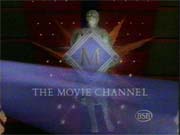The year 1970 in television involved some significant events. Below is a list of notable television-related events in that year.
Television in the United Kingdom started in 1936 as a public service which was free of advertising. Currently, the United Kingdom has a collection of free-to-air, free-to-view and subscription services over a variety of distribution media, through which there are over 480 channels for consumers as well as on-demand content. There are six main channel owners who are responsible for most material viewed. There are 27,000 hours of domestic content produced a year at a cost of £2.6 billion. Since 24 October 2012, all television broadcasts in the United Kingdom have been in a digital format, following the end of analogue transmissions in Northern Ireland. Digital content is delivered via terrestrial, satellite and cable, as well as over IP. As of 2003, 53.2% of households watch through terrestrial, 31.3% through satellite, and 15.6% through cable.

British Satellite Broadcasting (BSB) was a television company, headquartered in London, that provided direct broadcast satellite television services to the United Kingdom. The company was merged with Sky Television plc on 2 November 1990 to form British Sky Broadcasting (BSkyB). It started broadcasting on 25 March 1990.

Gold is a British pay television channel from the UKTV network, that was launched on 1 November 1992 as UK Gold before it was rebranded UKTV Gold in 2004. In 2008, it was split into current flagship channel Gold and miscellaneous channel, W, with classic comedy based programming now airing on Gold, non-crime drama and entertainment programming airing on W, and quiz shows and more high-brow comedy airing on Dave. It shows repeats of classic programming from the BBC and other broadcasters. From December 2015 until 2018, the channel was temporarily renamed as Christmas Gold. This has since been continued.
Sky Cinema is a group of British pay television film channels owned by Sky, a division of Comcast. They have over 5 million subscribers on subscription TV as of 2006. In the UK, Sky Cinema channels currently broadcast on the Sky satellite and Virgin Media cable platforms, and in addition Sky Cinema on demand content are available through these as well as via Now TV, BT TV and TalkTalk TV.
Sky One is a British pay television channel operated and owned by Sky, a division of Comcast, available in the United Kingdom and Ireland.

Sky Network Television Limited is a New Zealand pay television satellite TV provider. It is also a wholesale channel provider to New Zealand cable television provider Vodafone. On 30 June 2019, Sky had 778,840 subscribers across satellite and OTT services, making it the largest pay television platform in New Zealand, but still a lower amount than in 2016, when subscriber numbers peaked at over 850,000. Despite the similarity of name and services, such as Sky Go and MySky shared with its British equivalent, Sky, there is no longer a connection between the companies.
Free-to-view (FTV) is a term used for audio and/or video transmissions that are provided free-of-charge without any form of continual subscription but are nevertheless encrypted. It differs from free-to-air (FTA) where content is not encrypted.

Comedy Central is a British pay television channel that carries comedy programming, both original and syndicated. This channel is specific to audiences within the United Kingdom and Ireland. The channel is aligned with the original US version of the channel. The channel started as Paramount Channel in 1995, before rebranding as the Paramount Comedy Channel in 1997 and again as Paramount Comedy 1 before finally becoming Comedy Central on 6 April 2009.
FOX Classics is an Australian cable and satellite channel that specializes in showing television series and ad-free classic movies, themed movie nights and miniseries from the 1950s, 1960s, 1970s and some content from the 1980s and 1990s.

The Power Station was a British television channel that was operated by British Satellite Broadcasting. It was a dedicated music channel.
Analogue television in the United Kingdom includes terrestrial, satellite and cable services that were broadcast using analogue television signals. Following the termination of Virgin Media's analogue cable television service in Milton Keynes in November 2013, all television in the United Kingdom is broadcast in digital only.

Pick is a British free-to-air television channel, owned by Sky UK.
Sky Arts is an art-oriented television channel offering 24 hours a day of programmes dedicated to highbrow arts, including theatrical performances, movies, documentaries and music. The channel is available in the United Kingdom via Sky, Virgin Media, and TalkTalk TV and in the Republic of Ireland via Sky Ireland, Virgin Media Ireland, Vodafone Ireland and eir, included in most basic subscription packs, but started life as a premium service requiring an additional payment on top of the monthly Sky subscription. Sky Arts HD is also available on Sky and Virgin Media.
Sky Television plc was a public limited company which operated a nine-channel satellite television service, launched by Rupert Murdoch's News International on 5 February 1989. Sky Television and its rival British Satellite Broadcasting suffered large financial losses and merged on 2 November 1990 to form British Sky Broadcasting (BSkyB). Programming merger took effect on 1 December 1990.

Galaxy was a British satellite television channel focusing on general entertainment and children's programmes, one of the five channels run by British Satellite Broadcasting (BSB) and based at its Battersea Studios in the Marco Polo House Building. The channel broadcast a mix of home-grown programming, American imports and repeats from the BBC library.
There are four major forms of digital television (DTV) broadcast in the United Kingdom: a direct-to-home satellite service from the Astra 28.2°E satellites provided by Sky UK, a cable television service provided by Virgin Media ; a free-to-air satellite service called Freesat; and a free-to-air digital terrestrial service called Freeview. In addition, an IPTV system known as BT Vision is provided by BT. Individual access methods vary throughout the country. 77% of the United Kingdom has access to HDTV via terrestrial digital television. Satellite is the only source of HDTV broadcast available for the remaining 23%.

The Movie Channel was a British television channel, which only aired movies. Launched on BSB in 1990, The Movie Channel was a predecessor of some of the Sky Movies channels, having survived the merger with Sky Television, another satellite service launched by Rupert Murdoch's News International later in 1990 to form British Sky Broadcasting.
This is a timeline of the history of Sky TV.







